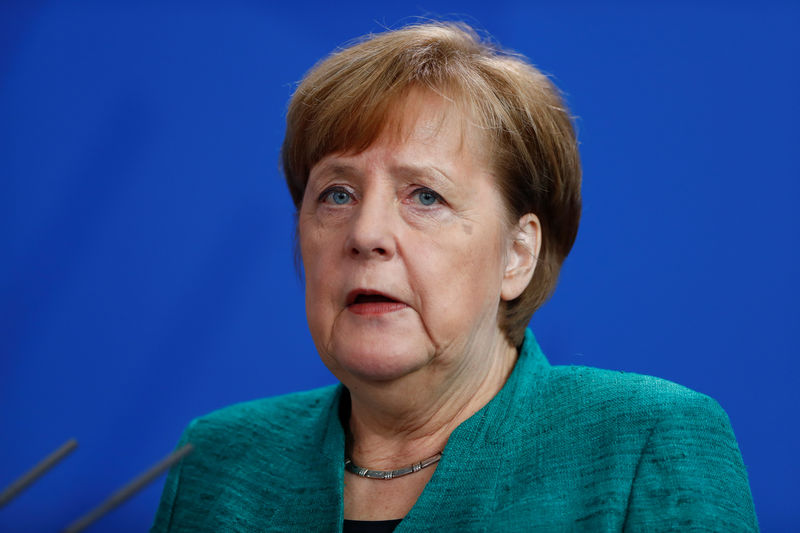 © Reuters. Chancellor Merkel and Polish Prime Minister Morawiecki address a news conference in Berlin
© Reuters. Chancellor Merkel and Polish Prime Minister Morawiecki address a news conference in BerlinBERLIN (Reuters) – Leading Social Democrat (SPD) mayors favor joining a coalition government with Chancellor Angela Merkel’s conservatives, a poll showed on Sunday, boosting the prospects of the center-left party backing the alliance in a ballot starting this week.
The SPD’s 464,000 members vote in a postal ballot from Tuesday on whether their party should go ahead with the coalition agreement its leaders clinched this month to renew their alliance with Merkel’s CDU/CSU bloc.
Newspaper Bild am Sonntag polled the mayors of the 35 biggest towns and cities ruled by the SPD and found that 26 of them said they would back the so-called ‘grand coalition’ – a re-run of the ruling alliance in power since 2013.
Of the other nine mayors, seven declined to give a view and two could not be reached, the newspaper reported.
Merkel turned to the SPD after her efforts to secure an alliance with the Greens and the pro-business Free Democrats failed in November. She had to make painful concessions to the SPD to break months of political deadlock after an inconclusive election on Sept. 24.
BALLOT IN THE BALANCE
The SPD’S leader-in-waiting, Andrea Nahles, is trying to convince members to back the coalition agreement ahead of the postal ballot, which will run through to March 2. The result, due to be announced on March 4, is wide open.
“I expect an intense debate here,” Nahles told Reuters TV before a meeting with party members in Kamen, near Dortmund in western Germany. “My impression is that here too … we can achieve something by making good arguments.”
Many in the party harbor misgivings about sharing power with Merkel, believing the party should rebuild in opposition after suffering its worst result in last September’s election since Germany became a federal republic in 1949.
On Tuesday, the SPD appointed Hamburg mayor Olaf Scholz as interim leader and recommended Nahles as longer-term successor to Martin Schulz, who resigned as leader to try to end turmoil in the party since it agreed the coalition deal.
The turbulence in the SPD has led to calls from some politicians in Merkel’s conservative bloc to drop the coalition plan and form a minority government instead.
Nahles told Der Spiegel magazine in an interview published on Saturday she had no “Plan B” should SPD members reject the coalition deal. Such an outcome could result in new elections – likely an unfavorable scenario for the party.
A survey by pollster Emnid for Bild am Sonntag showed support for the SPD down one percentage point on the week at 19 percent, with Merkel’s CDU/CSU bloc also down one point, at 33 percent.
The far-right Alternative for Germany (AfD) party was up two points at 14 percent, the Greens steady at 11 percent, the radical Left party up one point on 10 percent, and the business-friendly Free Democrats steady on nine points, the poll showed.
Fusion Media or anyone involved with Fusion Media will not accept any liability for loss or damage as a result of reliance on the information including data, quotes, charts and buy/sell signals contained within this website. Please be fully informed regarding the risks and costs associated with trading the financial markets, it is one of the riskiest investment forms possible.
Source: Investing.com






























